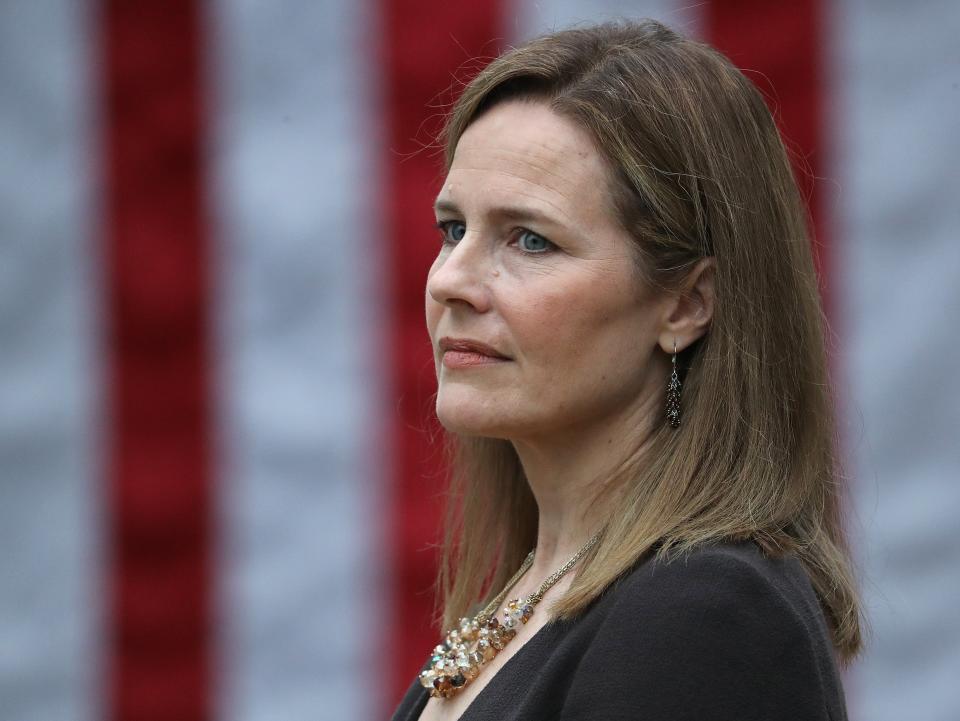I’m Catholic and I’ll never regret my abortion. Amy Coney Barrett doesn’t speak for me

When I had an abortion seventeen years ago, my reasons were simple: At twenty-three, I was not in any way prepared to be a mother. In the months after graduating college, I was under-employed and living in a small fixer-upper with my father. The man I was dating was nice enough, but not a life partner. I waited tables at night and planned my future during the day, making barely $300 a week while living just outside of New York City.
At twenty-three, I was in an enduring state of trial and error and I had dreams and goals for what my life was going to look like. I was not emotionally or economically fit to bring a child into this world, whether partnered or single, and I knew it.
Like many young women trying to pull their lives together, I was terrified of becoming pregnant. Despite precautions, it happened anyway. During this time, I was comforted by statistics: Nearly 25% of women chose to undergo an abortion in their lifetime. I was also comforted by geography: Thanks to my zip code at the time, I had easy access to the resources I would need to tend safely to my reproductive health. At the time, even under President George W Bush, there was a reasonable balance of political power that ensured my insulation from high-ranking men and women who didn’t know me, but may have wanted to punish me for daring to experience a sex life with female biology.
Like Amy Coney Barrett, I am Catholic. I will never regret my abortion. Americans deserve a Supreme Court justice who cares about women’s mental health more than she cares about zygotes and religion.
Seventeen years after my abortion, my spouse and I are terrified of what another religious extremist on the Supreme Court could mean for our family.
Because I am scientifically literate and understand the concept of fetal viability, it remains true that I’ve never regretted my decision to terminate what was nothing more than a fertilized ovum. However, I now find myself navigating my reproductive life in that same state of juvenile terror, save for a few major differences: Now, I’m forty. I’m still fertile, but any potential for pregnancy across this next decade is met with an increased possibility of fetal anomalies. I also now live in the Midwest, in a state blighted by disturbing pockets of red.
At forty, I am also a patient in trauma therapy and working through complex post-traumatic stress disorder. C-PTSD is a form of trauma that lives in the brain far past the timeframe during which it was experienced and is, at times, a debilitating mental health condition. Navigating my condition, particularly when my symptoms flare without warning, can be a full-time job. Given my current realities, I unapologetically remain unequipped for motherhood. If I were to need an abortion tomorrow, it would be a choice made in favor of my mental health.
Moreover, my body rejects synthetic hormones, leaving me to endure physical and emotional symptoms that I wouldn’t wish on anyone. I am not about to seek an elective hysterectomy to protect myself from the veritable erosion of women’s rights accelerated by the dangerous ideas of people like Amy Coney Barrett.
It remains true that motherhood does not fit into my life, and I am unwilling to make the outsized sacrifices required so that it does. Much like President Trump’s slew of mistresses, I am entitled to a sex life even though I’ve eschewed parenthood. The hypocrisy is stifling: How many Trump children would be roaming the earth today if the world that Coney Barrett is desperate to create existed twenty to thirty years ago?
As Coney Barrett’s record makes clear, American women are likely to face a stunning blow to reproductive freedom under her leadership. As I enter middle life, I face the real possibility that a woman barely one decade older than myself can destroy my physical and mental health with one pound of the gavel. It’s infantilizing. Since the age of sixteen, I’ve spent more than two decades shakily managing my fertility. Those years were laced with fear until, finally, I became comfortable with my biology and the capacity for science to deal with real-time accidents.
I should not have to live my last decade of fertility celibate and in fear of a powerful woman whose wanton disregard for reproductive freedom could force me into motherhood — a role for which I've long decided I am grossly unfit.
I assume that Coney Barrett and her spouse are still sexually active, and at forty-eight, she might still be fertile for a handful of years in front of her. Is she prepared to endure the world she creates? And might the president have waited for Ruth Bader Ginsburg’s body to go cold before he jumped at the chance to imagine that world? Most Catholics I know mourn for a period of time before returning to business as usual. Let’s hope Barrett sticks at the very least to that convention.

